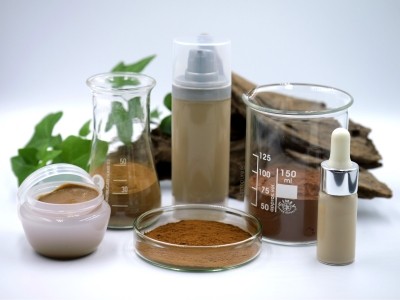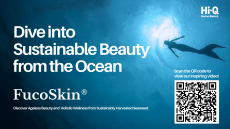What are exosomes in skin care and why do they matter?

From Dr Barbara Sturm’s Exoso Metic range to Eucerin’s Hyaluron-Filler Epigenetic Serum, made with its Epicelline ingredient, many skin care brands have been launching formulations based around epigenetics.
Last week US-based doctor skin care brand Beekman 1802 launched Milk RX Cream, which it had formulated with ‘goat milk exosomes.’
The company claimed that “through advanced proteomic testing and electron microscopy, we have discovered the potential of goat milk exosomes to enhance cellular activity and signal the skin's matrix.”
It has combined this ingredient with reneseed polypeptides, which it says this “promotes increased collagen production, resulting in a tighter, more lifted appearance.”
Beekman 1802 has been researching goat milk for 15 years and says it is a rich source of exosomes. Its clinical research has shown that the milk “not only contains nutrient-dense exosomes loaded with keratin and immunoglobulins, but also has an average size of 102.8 to 109.3 nanometers and a concentration of approximately 116 billion particles per millilitre.”
What are exosomes for skin care?
Exosomes are nano-sized particles (about 30 – 200 nanometres wide) naturally secreted by stem cells, that are being used for skin and hair rejuvenation. They are naturally found in the body and are being considered an important breakthrough in skin ageing therapy.
They offer a multifaceted approach to tackling ageing concerns and can help lessen wrinkles, enhance skin texture, and improve elasticity.
In recent years they have become popular with aesthetic doctors for use in facial skin care treatments, as well as for hair loss treatment on the scalp. They are frequently being combined with traditional aesthetic clinic treatments, such as a microneedling, to boost the effects.
According to cosmetic doctor Dr Aggie Zatonska, who owns the Atelier Clinic in Surrey, UK, there are three types of exosomes:
1. Plant- based exosomes that “mimic ours in the skin's revitalising process, reducing inflammation, while increasing collagen, elastin, and hyaluronic acid production.”
2. Synthetic exosomes that “are artificially created in laboratory settings using biomimetic approaches.” These can be engineered to contain specific bioactive molecules, allowing for precise control over their therapeutic effects. For example, “there are specifically designed exosomes that help to improve hair growth.
3. Human-derived exosomes, which are not licensed for use in the EU or UK markets.
Dr Zatonska says that there are various ways that exosomes can enhance skin quality. These include:
Stimulation of collagen production
“Exosomes stimulate fibroblasts to produce collagen, a key protein responsible for maintaining skin firmness and elasticity. By promoting collagen synthesis, exosomes help reduce the appearance of fine lines and wrinkles, resulting in smoother, more youthful-looking skin,” she explained.
“Exosomes contain bioactive molecules, such as growth factors, cytokines, and microRNAs, which can modulate cellular signalling pathways involved in collagen synthesis. By delivering these signalling molecules to target cells, Exosomes stimulate the activation of fibroblasts, the cells responsible for producing collagen.”
Skin hydration
“Exosomes contain bioactive molecules including growth factors, antioxidants and peptides that enhance the skin's ability to retain moisture. By reducing inflammation, exosomes promote a healthier skin barrier and improve hydration.”
Reduction of oxidative stress
“Exosomes that contain antioxidants and vital micro elements neutralising free radicals reduce the oxidative stress.”
A future focus on plant-derived exosomes
Although the use of exosomes has been on many aesthetic doctors’ radars over the past two years, this is still a growing space in terms of cosmetics products formulations. However, this year there has been an increased focus on plant-based exosomes.
For example, in April, the multinational ingredients company dsm-firmenich announced it would be collaborating with ExoLab Italia, an Italian startup specialising in plant-derived exosomal technologies, made from Italian organic fruits and vegetables.
dsm-firmenich said plant-derived exosomes “offer a multitude of benefits for personal care and beauty products and, ultimately, for skin health.”
It also said that the collaboration marked “a pivotal moment in its broader strategy for innovation and sustained growth” and that it intended on becoming “a pioneer in bringing the innovative, plant-derived exosomes technology to the global skincare market.”
Meanwhile, CEO of ExoLab Italia, Gabriele Campi said that "By focusing on plant-derived exosomes, ExoLab Italia offers distinctive scientific proficiency in cellular health and skin recovery which, combined with dsm-firmenich's renowned expertise in skin biology, claim substantiation, and active ingredients, offers immense potential to elevate the standards of natural and effective skincare to unprecedented heights."





























